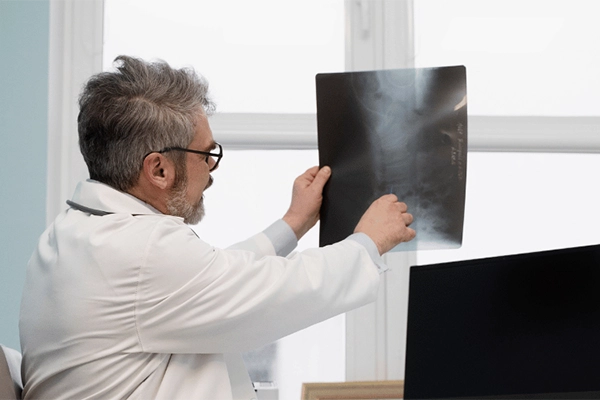Topics
Constipation, typically defined as having fewer than three bowel movements per week, is a common issue that can lead to discomfort and digestive difficulties. However, when it becomes chronic, lasting for several weeks or longer, it may indicate underlying factors or lifestyle habits contributing to persistent constipation.
Chronic constipation can affect individuals of all ages, making it important to identify its causes to get effective treatment. For individuals seeking support, Pantai Hospitals offers specialised services to help address chronic constipation through lifestyle guidance and medical interventions.
What Are the Causes for Chronic Constipation?
1. Low-Fiber Diet
One of the most common contributors to chronic constipation is a diet lacking sufficient fibre. Fibre adds bulk to stool, promoting movement through the intestines, which makes passing stools easier. Without enough fibre, stools become hard and challenging to pass. This problem is particularly prevalent among those consuming high amounts of processed foods, which often contain minimal fibre. Increasing fibre intake through fruits, vegetables, and whole grains can significantly reduce constipation symptoms.
2. Dehydration
Water intake is essential for digestive health, as it helps soften stool, making it easier to pass. When the body is dehydrated, it compensates by drawing water from the colon, which makes stools dry, hard, and more difficult to expel. For individuals struggling with chronic constipation, increasing daily water intake is a practical first step. Staying hydrated, especially by consuming water-rich foods like watermelon and cucumbers, can also help maintain regularity.
3. Sedentary Lifestyle
Physical activity is essential for keeping the digestive system active. A sedentary lifestyle often results in slower digestion and reduced intestinal contractions, contributing to constipation. Engaging in regular exercise, such as brisk walking, jogging, or swimming, can stimulate bowel movement and improve digestive health. Physical activity also improves muscle tone, which can help manage constipation symptoms in older adults.
4. Ignoring the Urge to Go to Toilet
Ignoring the urge to have a bowel movement can be a common but overlooked factor in chronic constipation. This habit allows stool to stay longer in the colon, where more water is absorbed, making it harder and more difficult to pass. Regularly responding to bowel urges when they first occur can help establish a healthy bowel movement pattern, especially for children or individuals with busy schedules who may delay bathroom breaks.
5. Medications
Certain medications can contribute to chronic constipation as a side effect. Common medications linked to constipation include opioid pain relievers, certain antidepressants, antihistamines, and some antacids. For those who experience constipation related to medication, speaking with healthcare providers at Pantai Hospitals may help identify possible adjustments or alternative treatments to alleviate symptoms while managing the underlying health condition.
6. Medical Conditions and Disorders
Chronic constipation can also be a sign of an underlying health issue. Conditions such as irritable bowel syndrome (IBS), diabetes, hypothyroidism, and neurological disorders like Parkinson’s disease and multiple sclerosis can all impact digestion and lead to constipation. For individuals who suspect an underlying medical cause, consulting a gastroenterology specialist at Pantai Hospitals can help diagnose and manage these health conditions effectively.
7. Hormonal Fluctuations
Hormonal changes can significantly impact bowel movements, especially during certain life stages. For example, women may experience constipation due to hormonal shifts related to menstruation, pregnancy, or menopause. Hormones like oestrogen and progesterone affect bowel motility, causing delays in stool passage.
8.Aging
As people age, the digestive system may naturally slow down due to decreased muscle contractions in the intestines. Older adults are often more prone to constipation as a result, compounded by factors such as lower physical activity levels, medication side effects, and dietary limitations. Additionally, age-related changes in metabolism and decreased fluid intake can exacerbate constipation symptoms. Proper hydration, a balanced diet, and regular physical activity are all important measures that can help manage constipation in ageing adults.
9.Psychological Stress
Chronic stress and anxiety are linked to many digestive issues, including constipation. The gut-brain connection means that stress hormones can disrupt the balance and function of the digestive system, leading to slowed bowel movements. Individuals experiencing stress-related constipation may find relief through relaxation techniques, such as meditation or breathing exercises, which can help regulate digestion by reducing stress levels.
Frequently Asked Questions (FAQs)
1. What is the gut microbiome, and why is it important?
The gut microbiome consists of trillions of bacteria that aid digestion, boost immunity, and influence overall health. A balanced microbiome promotes efficient digestion and prevents digestive disorders.
2. Are laxatives safe to use for chronic constipation?
Laxatives can offer short-term relief but should not be used long-term without consulting a healthcare provider, as they may lead to dependency.
3. Are probiotics helpful for digestion?
Yes, probiotics can support a healthy gut microbiome, improve digestion, and help manage conditions like irritable bowel syndrome (IBS) and diarrhoea.
Book an Appointment at Pantai Hospitals
Chronic constipation can have a major impact on daily life, often causing discomfort, bloating, and changes in bowel habits that disrupt routine activities. If you are experiencing persistent constipation, seeking medical advice early can make a significant difference. The expert team of gastroenterologists at Pantai Hospitals provides personalised treatment plans and guidance on lifestyle adjustments to alleviate constipation and improve digestive health.
If you have concerns about constipation or other gastrointestinal symptoms, please reach out to your nearest Pantai Hospitals by making an appointment through our website, or download our MyHealth360 application from Google Play Store or Apple App Store. Our expert gastroenterology team is here to help you find relief and manage constipation effectively.
Pantai Hospitals have been accredited by the Malaysian Society for Quality in Health (MSQH) for its commitment to patient safety and service quality.












